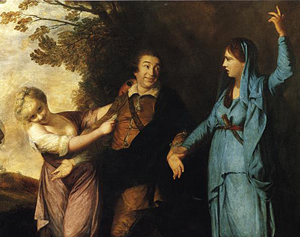
Source: Reynolds-Garrick between tragedy and comedy, Joshua Reynolds, Wikimedia
Look at this painting and describe what is going on. You could say, “It is some dude being pulled in two different directions.”
That might be an accurate description, but is there a way to say it more descriptively? That’s where diction or word choice becomes handy. A better way to describe the painting might be as follows: “In this scene, a playful woman wearing a sly grin pulls an amused man away from a dramatic, serious-looking woman.”
Both statements are similar in meaning, but the second one uses more descriptive language. The second statement not only tells you but shows you what is happening in the painting. Unlike this example, the books you read won’t likely have pictures to help you create an image in your mind. This is one of many reasons that you need to be able to recognize and understand the diction or the words an author chooses.
For the next exercise, read the five quotations and follow these steps:
- Read each quotation carefully and notice the author's diction.
- Click on the words or phrases that have something in common with each other and that reflect the author's unique word choices for conveying a message. Although answers may vary, there are words that stand out in each quotation.
- To see the words we chose, check your understanding after each quotation.
Let there be no illusions about the difficulty of forming this kind of a national community. It’s tough, difficult, not easy. But a spirit of harmony will survive in America only if each of us remembers that we share a common destiny; if each of us remembers, when self-interest and bitterness seem to prevail, that we share a common destiny.
These are some of the word choices or diction that help us understand what Jordan is saying: national community, spirit of harmony, survive, self-interest, common destiny, and bitterness.
It is not the critic who counts; not the man who points out how the strong man stumbles, or where the doer of deeds could have done them better. The credit belongs to the man who is actually in the arena, whose face is marred by dust and sweat and blood; who strives valiantly; who errs, who comes short again and again, because there is no effort without error and shortcoming; but who does actually strive to do the deeds; who knows great enthusiasms, the great devotions; who spends himself in a worthy cause; who at the best knows in the end the triumph of high achievement, and who at the worst, if he fails, at least fails while daring greatly, so that his place shall never be with those cold and timid souls who neither know victory nor defeat.
There he defeated the King of Armenia, and reduced Cappadocia to provincial status, but succumbed to a protracted illness at Antioch, being thirty-three years old when he died.
Our terribly wasteful use of electricity and non-renewable resources are likewise endangering our rivers, our oceans, and the atmosphere, which protects the planet.
Music at its best . . . is the grand archeology into and transfiguration of our guttural cry, the great human effort to grasp in time our deepest passions and yearnings as prisoners of time. Profound music leads us—beyond language—to the dark roots of our scream and the celestial heights of our silence.